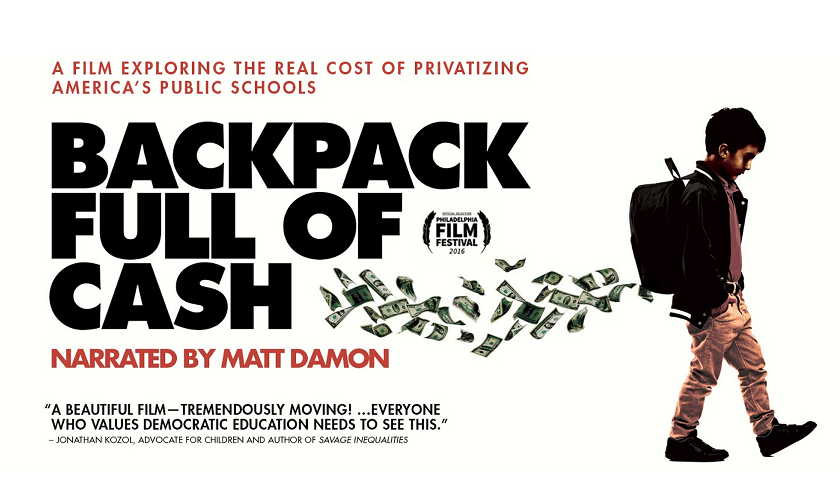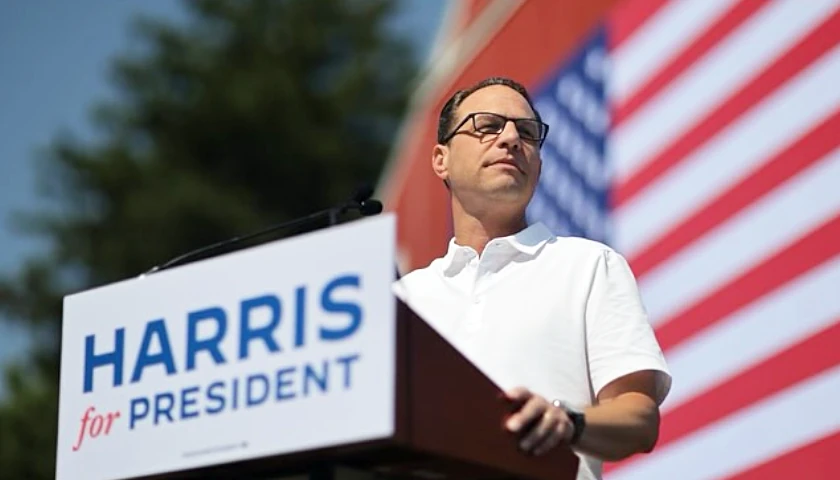A documentary taking a critical look at charter schools and vouchers was shown Tuesday evening at the Nashville Film Festival.
“Backpack Full of Cash” was filmed partly in Nashville and features Metro Nashville school board member Amy Frogge, who attended Tuesday’s screening at the Regal Hollywood 27 at 100 Oaks.
Both charter schools and vouchers were referred to in the movie as efforts toward privatization. Charter schools are publicly funded but privately run. Vouchers, sometimes called scholarships, allow students to attend private schools with public money. The title of the documentary refers to a metaphor used by a privatization proponent in the movie to illustrate how an allotted amount of taxpayer money follows each student to the school of their choice.
Nashville has a number of charter schools and a voucher bill is currently moving through the state legislature. It will be heard Wednesday morning by the House Finance, Ways and Means Subcommittee.
The issue of privatization has ignited powerful and emotional reactions but ones that don’t fall along traditional ideological lines, proving the adage that politics makes strange bedfellows. Some conservatives are strong proponents of privatization, but so are Bill and Melinda Gates, also known for supporting progressive causes.
The documentary gives a prominent role to Diane Ravitch, former assistant secretary of education under George H.W. Bush. Once a supporter of charter schools and school reform efforts like George W. Bush’s No Child Left Behind, she now speaks out against them. Ravitch and others in the movie blast the “corporate reformers” like the Gates, the Walton Family Foundation and the Broad Foundation for weakening local control of schools.
Critics in the movie also say that charter schools, far from being a magic bullet, have had mixed results. Some charter schools are better than neighboring traditional public schools, but on a national scale, they haven’t proven any better, according to a study by Stanford University cited in the movie. Also, while charter schools are supposed to be open to all students, they have found subtle ways to limit the number of students who are not native English speakers, need special education services or have juvenile court records.
Narrated by actor Matt Damon, the movie was filmed largely in impoverished Philadelphia and in New Orleans, which turned to privatization when rebuilding after Hurricane Katrina. New Orleans established charter schools and also started voucher programs that allowed many students to start attending religious schools, deemed a violation of the separation of church and state by critics in the documentary.
The portion filmed in Nashville focused on frustration with accepting money from President Obama through his Race to the Top program, which followed No Child Left Behind. Frogge, the school board member, and teachers who were interviewed said students were being tested excessively and data was becoming an unhealthy obsession, taking the joy out of learning and driving stressed-out teachers from the profession. The movie linked the focus on testing to the rise of privatization efforts because such efforts are sold as ways to boost test scores.
Frogge told The Tennessee Star that many of the problems depicted in the movie about charter schools elsewhere hold true for those in Nashville as well. Frogge said charter schools are “largely unregulated,” which has prompted her to advocate for greater fiscal transparency. Charter schools are having a “negative fiscal impact” on the school district because of the money they siphon away, she said. She also said she’s concerned about how they “sculpt” the make-up of their student populations and send some students back to their zoned schools.
In addition to addressing brick-and-mortar charter schools, the documentary talks about the growth of online charter schools, which it maintains has produced dismal results. Ravitch and others said students lose out on the personal connection with a teacher and other students and that programs are mostly run to make a profit.
The movie presents as solutions greater funding of traditional public schools and holding teachers to high standards while also providing them with a warm and supportive environment. However, the movie does not seriously address the complex range of issues that frustrate parents of traditional public school students. Problems with dwindling resources are noted, but not problems with student disrespect and violence that create chaotic environments in some schools, prompting parents to demand something else for their children.





